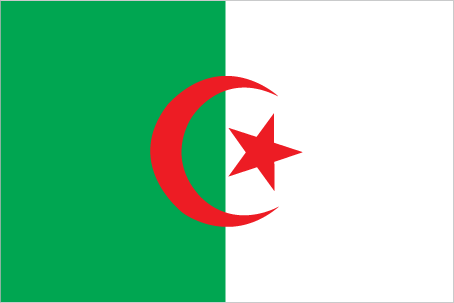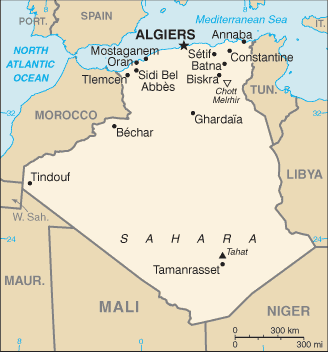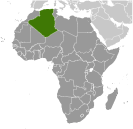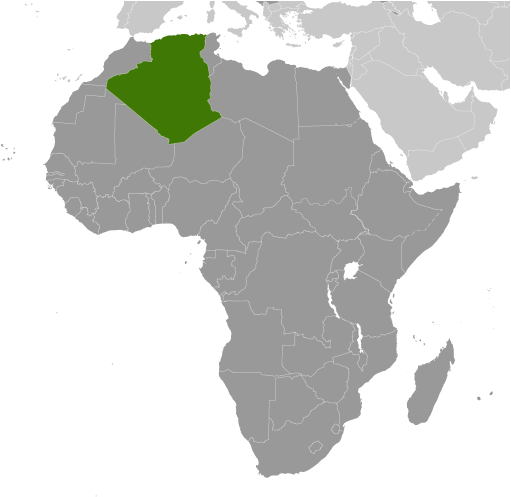|

Administrative divisions (GPS Maps)
Geography
People and Society
Government
Economy
Communications
Transportation
Military |
 |
 After more than a century of rule by France, Algerians fought through much of the 1950s to achieve independence in 1962. Algeria's primary political party, the National Liberation Front (FLN), was established in 1954 as part of the struggle for independence and has largely dominated politics since. The Government of Algeria in 1988 instituted a multi-party system in response to public unrest, but the surprising first round success of the Islamic Salvation Front (FIS) in the December 1991 balloting spurred the Algerian army to intervene and postpone the second round of elections to prevent what the secular elite feared would be an extremist-led government from assuming power. The army began a crackdown on the FIS that spurred FIS supporters to begin attacking government targets, and fighting escalated into an insurgency, which saw intense violence between 1992-98 resulting in over 100,000 deaths - many attributed to indiscriminate massacres of villagers by extremists. The government gained the upper hand by the late-1990s, and FIS's armed wing, the Islamic Salvation Army, disbanded in January 2000. Abdelaziz BOUTEFLIKA, with the backing of the military, won the presidency in 1999 in an election widely viewed as fraudulent. He was reelected to a second term in 2004 and overwhelmingly won a third term in 2009 after the government amended the constitution in 2008 to remove presidential term limits. Longstanding problems continue to face BOUTEFLIKA, including large-scale unemployment, a shortage of housing, unreliable electrical and water supplies, government inefficiencies and corruption, and the continuing activities of extremist militants. The Salafist Group for Preaching and Combat (GSPC) in 2006 merged with al-Qa'ida to form al-Qa'ida in the Lands of the Islamic Maghreb, which has launched an ongoing series of kidnappings and bombings targeting the Algerian Government and Western interests. The government in 2011 introduced some political reforms in response to the Arab Spring, including lifting the 19-year-old state of emergency restrictions, ending the state's monopoly on broadcast media, increasing women's quotas for elected assemblies, and expanding the role of judges in administering elections. Political protest activity in the country remained low in 2011, but small, sometimes violent socioeconomic demonstrations by disparate groups continued to be a common occurrence. Parliamentary elections held in May 2012 resulted in an increase of seats for presidentially-aligned parties. Parliament in 2013 is expected to revise the constitution. After more than a century of rule by France, Algerians fought through much of the 1950s to achieve independence in 1962. Algeria's primary political party, the National Liberation Front (FLN), was established in 1954 as part of the struggle for independence and has largely dominated politics since. The Government of Algeria in 1988 instituted a multi-party system in response to public unrest, but the surprising first round success of the Islamic Salvation Front (FIS) in the December 1991 balloting spurred the Algerian army to intervene and postpone the second round of elections to prevent what the secular elite feared would be an extremist-led government from assuming power. The army began a crackdown on the FIS that spurred FIS supporters to begin attacking government targets, and fighting escalated into an insurgency, which saw intense violence between 1992-98 resulting in over 100,000 deaths - many attributed to indiscriminate massacres of villagers by extremists. The government gained the upper hand by the late-1990s, and FIS's armed wing, the Islamic Salvation Army, disbanded in January 2000. Abdelaziz BOUTEFLIKA, with the backing of the military, won the presidency in 1999 in an election widely viewed as fraudulent. He was reelected to a second term in 2004 and overwhelmingly won a third term in 2009 after the government amended the constitution in 2008 to remove presidential term limits. Longstanding problems continue to face BOUTEFLIKA, including large-scale unemployment, a shortage of housing, unreliable electrical and water supplies, government inefficiencies and corruption, and the continuing activities of extremist militants. The Salafist Group for Preaching and Combat (GSPC) in 2006 merged with al-Qa'ida to form al-Qa'ida in the Lands of the Islamic Maghreb, which has launched an ongoing series of kidnappings and bombings targeting the Algerian Government and Western interests. The government in 2011 introduced some political reforms in response to the Arab Spring, including lifting the 19-year-old state of emergency restrictions, ending the state's monopoly on broadcast media, increasing women's quotas for elected assemblies, and expanding the role of judges in administering elections. Political protest activity in the country remained low in 2011, but small, sometimes violent socioeconomic demonstrations by disparate groups continued to be a common occurrence. Parliamentary elections held in May 2012 resulted in an increase of seats for presidentially-aligned parties. Parliament in 2013 is expected to revise the constitution. |
|
Advertisements
|
Advertisements
|
Telephones - main lines in use World Ranking: 50
3.059 million (2011)
Telephones - mobile cellular World Ranking: 30
35.406 million (2011)
Telephone system
General assessment Privatization of Algeria's telecommunications sector began in 2000; three mobile cellular licenses have been issued and, in 2005, a consortium led by Egypt's Orascom Telecom won a 15-year license to build and operate a fixed-line network in Algeria; the license will allow Orascom to develop high-speed data and other specialized services and contribute to meeting the large unfulfilled demand for basic residential telephony; Internet broadband services began in 2003 Domestic A limited network of fixed lines with a teledensity of less than 10 telephones per 100 persons has been offset by the rapid increase in mobile-cellular subscribership; in 2011, mobile-cellular teledensity was roughly 100 telephones per 100 persons International Country code - 213; landing point for the SEA-ME-WE-4 fiber-optic submarine cable system that provides links to Europe, the Middle East, and Asia; microwave radio relay to Italy, France, Spain, Morocco, and Tunisia; coaxial cable to Morocco and Tunisia; participant in Medarabtel; satellite earth stations - 51 (Intelsat, Intersputnik, and Arabsat) (2009)
Broadcast media
State-run Radio-Television Algerienne operates the broadcast media and carries programming in Arabic, Berber dialects, and French; use of satellite dishes is widespread, providing easy access to European and Arab satellite stations; state-run radio operates several national networks and roughly 40 regional radio stations (2007)
Internet country code
.dz
Internet hosts World Ranking: 179
561 (2010)
Internet users World Ranking: 49
4.7 million (2009)
|
Advertisement
Members area
Algeria (Algiers):
GPS points from Algeria (Algiers)
|




 After more than a century of rule by France, Algerians fought through much of the 1950s to achieve independence in 1962. Algeria's primary political party, the National Liberation Front (FLN), was established in 1954 as part of the struggle for independence and has largely dominated politics since. The Government of Algeria in 1988 instituted a multi-party system in response to public unrest, but the surprising first round success of the Islamic Salvation Front (FIS) in the December 1991 balloting spurred the Algerian army to intervene and postpone the second round of elections to prevent what the secular elite feared would be an extremist-led government from assuming power. The army began a crackdown on the FIS that spurred FIS supporters to begin attacking government targets, and fighting escalated into an insurgency, which saw intense violence between 1992-98 resulting in over 100,000 deaths - many attributed to indiscriminate massacres of villagers by extremists. The government gained the upper hand by the late-1990s, and FIS's armed wing, the Islamic Salvation Army, disbanded in January 2000. Abdelaziz BOUTEFLIKA, with the backing of the military, won the presidency in 1999 in an election widely viewed as fraudulent. He was reelected to a second term in 2004 and overwhelmingly won a third term in 2009 after the government amended the constitution in 2008 to remove presidential term limits. Longstanding problems continue to face BOUTEFLIKA, including large-scale unemployment, a shortage of housing, unreliable electrical and water supplies, government inefficiencies and corruption, and the continuing activities of extremist militants. The Salafist Group for Preaching and Combat (GSPC) in 2006 merged with al-Qa'ida to form al-Qa'ida in the Lands of the Islamic Maghreb, which has launched an ongoing series of kidnappings and bombings targeting the Algerian Government and Western interests. The government in 2011 introduced some political reforms in response to the Arab Spring, including lifting the 19-year-old state of emergency restrictions, ending the state's monopoly on broadcast media, increasing women's quotas for elected assemblies, and expanding the role of judges in administering elections. Political protest activity in the country remained low in 2011, but small, sometimes violent socioeconomic demonstrations by disparate groups continued to be a common occurrence. Parliamentary elections held in May 2012 resulted in an increase of seats for presidentially-aligned parties. Parliament in 2013 is expected to revise the constitution.
After more than a century of rule by France, Algerians fought through much of the 1950s to achieve independence in 1962. Algeria's primary political party, the National Liberation Front (FLN), was established in 1954 as part of the struggle for independence and has largely dominated politics since. The Government of Algeria in 1988 instituted a multi-party system in response to public unrest, but the surprising first round success of the Islamic Salvation Front (FIS) in the December 1991 balloting spurred the Algerian army to intervene and postpone the second round of elections to prevent what the secular elite feared would be an extremist-led government from assuming power. The army began a crackdown on the FIS that spurred FIS supporters to begin attacking government targets, and fighting escalated into an insurgency, which saw intense violence between 1992-98 resulting in over 100,000 deaths - many attributed to indiscriminate massacres of villagers by extremists. The government gained the upper hand by the late-1990s, and FIS's armed wing, the Islamic Salvation Army, disbanded in January 2000. Abdelaziz BOUTEFLIKA, with the backing of the military, won the presidency in 1999 in an election widely viewed as fraudulent. He was reelected to a second term in 2004 and overwhelmingly won a third term in 2009 after the government amended the constitution in 2008 to remove presidential term limits. Longstanding problems continue to face BOUTEFLIKA, including large-scale unemployment, a shortage of housing, unreliable electrical and water supplies, government inefficiencies and corruption, and the continuing activities of extremist militants. The Salafist Group for Preaching and Combat (GSPC) in 2006 merged with al-Qa'ida to form al-Qa'ida in the Lands of the Islamic Maghreb, which has launched an ongoing series of kidnappings and bombings targeting the Algerian Government and Western interests. The government in 2011 introduced some political reforms in response to the Arab Spring, including lifting the 19-year-old state of emergency restrictions, ending the state's monopoly on broadcast media, increasing women's quotas for elected assemblies, and expanding the role of judges in administering elections. Political protest activity in the country remained low in 2011, but small, sometimes violent socioeconomic demonstrations by disparate groups continued to be a common occurrence. Parliamentary elections held in May 2012 resulted in an increase of seats for presidentially-aligned parties. Parliament in 2013 is expected to revise the constitution.